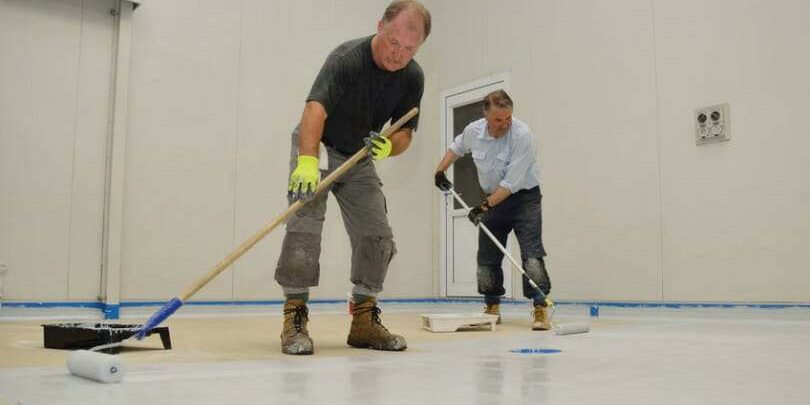In the realm of home improvement, selecting the best garage floor coating stands out as a decision that significantly impacts both the functionality and aesthetics of your garage space. Whether you’re a DIY enthusiast, a car lover, or simply looking to enhance the value of your home, understanding the nuances of garage floor coatings is essential.
Garage Floor Coatings
Understanding the Importance of Garage Floor Coatings
A robust garage floor coating is more than a superficial addition. It protects the concrete from oil spills, chemicals, and tire marks, while also making the space brighter and easier to clean. The best garage floor coating adds durability to your garage floor, resisting wear and tear from daily use.
Types of Garage Floor Coatings: A Brief Overview
From epoxy and polyurethane to polyaspartic and acrylic sealers, each type of coating offers unique benefits and drawbacks. Understanding these can help you make an informed decision about the best garage floor coating for your specific needs.
Factors to Consider When Choosing a Coating
Key considerations include the coating’s resistance to stains and abrasions, its longevity, the maintenance it requires, and of course, the visual appeal.
Epoxy Coatings: Durable and Stylish
What is Epoxy Coating?
Epoxy, a thermosetting resin, is known for its toughness. It’s a combination of a resin and a hardener that, when mixed, forms a rigid plastic material that strongly adheres to the substrate.
Benefits of Choosing Epoxy for Your Garage
This coating is robust, and resistant to impacts, stains, and chemicals, making it one of the best garage floor coatings for a high-traffic area like a garage.
Application Process and Tips
For a successful epoxy application, the concrete must be properly prepared. This involves cleaning, repairing cracks, and ensuring the floor is level. Temperature and humidity also play crucial roles in the curing process.
Polyurethane Coatings: A Flexible Alternative
Understanding Polyurethane Coatings
Polyurethane is a polymer composed of organic units joined by urethane links. It’s known for its flexibility, which can be advantageous in spaces where temperature fluctuations are common.
Comparing Epoxy and Polyurethane Coatings
While epoxy is known for its strength and adhesive properties, polyurethane offers superior resistance to UV radiation and is less prone to yellowing over time, making it an excellent choice for sun-exposed garages.
Application Tips for Polyurethane Coating
Applying polyurethane requires precision. It’s typically applied as a topcoat over epoxy for added protection and a high-gloss finish. Ensure that the epoxy base is fully cured before applying the polyurethane layer.
Polyaspartic Coatings: Fast and Efficient
Introduction to Polyaspartic Coatings
Polyaspartic coatings are a type of polyurea, known for their quick curing times. They were initially developed for industrial applications but have gained popularity in residential settings.
Advantages Of Traditional Coatings
One of the main advantages of polyaspartic coatings is their rapid curing process, which can be as quick as an hour. This property, combined with their UV stability and resistance to stains, makes them contenders for the best garage floor coating.
Application Techniques and Considerations
Due to their fast curing time, polyaspartic coatings require quick and efficient application. This can be challenging for DIYers, so professional installation is often recommended.
Acrylic Sealers: Cost-Effective and Simple
What Are Acrylic Sealers?
Acrylic sealers are water or solvent-based sealers that provide a thin protective layer. They are ideal for light-use garages and for homeowners looking for a cost-effective solution.
Pros and Cons of Acrylic Coatings
The main advantage of acrylic sealers is their cost-effectiveness and ease of application. However, they offer less protection compared to epoxy or polyurethane and may require more frequent reapplication.
Application Guide for Beginners
Applying an acrylic sealer is straightforward. The surface should be clean and dry, and the sealer can be applied using a roller or sprayer. It’s an excellent project for homeowners looking to start their journey in DIY home improvements.
Concrete Stains: Aesthetic and Unique
Exploring the Beauty of Concrete Stains
Concrete stains penetrate the surface of the concrete, offering a permanent color that doesn’t flake or peel. They are available in a wide range of colors and create a translucent, marbled effect.
How to Choose the Right Stain for Your Garage
When selecting a concrete stain, consider the current condition and color of your concrete. Stains are semi-transparent and will not hide existing imperfections.
DIY Staining Tips
Staining is a multi-step process involving cleaning, applying the stain, and then sealing it. It requires precision and patience but can be a rewarding DIY project for those who enjoy hands-on work.
Choosing the Right Coating for Your Climate
Understanding Climate Impact on Coatings
Different coatings respond differently to temperature changes, humidity, and sunlight exposure. The best garage floor coating for a humid coastal area might not be the best choice for a dry, hot climate.
Best Coatings for Hot and Cold Climates
In areas with extreme temperature fluctuations, polyurethane can be an excellent choice due to its flexibility. Epoxy, while durable, can be prone to cracking in such conditions.
Maintenance Tips for Longevity
Regular maintenance, such as cleaning and occasional touch-ups, is crucial regardless of the coating type. This ensures the longevity of your best garage floor coating, keeping it looking fresh and new for years.
Cost Considerations and Budgeting
Estimating the Cost of Garage Floor Coatings
The cost varies based on the type of coating, the size of your garage, and whether you opt for DIY or professional installation. Epoxy and polyurethane tend to be more expensive than acrylic sealers or concrete stains.
Budget-Friendly Options
For those on a tight budget, acrylic sealers or DIY epoxy kits can be cost-effective solutions. However, they may not offer the same level of protection as more premium options.
When to Splurge on Premium Coatings
If your garage sees heavy use, or if you’re looking for a long-term solution with minimal maintenance, investing in a higher-quality coating like polyaspartic or a professional-grade epoxy might be worthwhile.
DIY vs Professional Installation
Evaluating DIY Coating Projects
While DIY projects can be rewarding and cost-effective, they require a significant time commitment and a certain level of skill. The best garage floor coating might be within your reach as a DIY project, but it’s important to realistically assess your abilities and the complexity of the task.
Finding the Right Professional for the Job
For those who prefer professional installation, it’s crucial to choose a contractor with experience in garage floor coatings. Look for reviews, ask for references, and compare quotes to ensure you’re getting quality work.
Cost-Benefit Analysis of DIY vs Professional
Consider the long-term benefits versus the initial cost. A professionally installed coating might be more expensive upfront but could offer better durability and a more professional finish.
Maintenance and Care of Your Garage Floor Coating
Regular Maintenance Tips
Simple steps like keeping the floor clean, wiping up spills immediately, and avoiding harsh chemicals can extend the life of your coating. For epoxy and polyurethane coatings, a gentle cleanser and a soft mop are usually sufficient.
Addressing Wear and Tear
Inspect your floor regularly for signs of wear, such as cracks or peeling. Addressing these issues promptly can prevent further damage and extend the life of your coating.
Long-Term Care for Different Coatings
Each type of coating has its specific care requirements. Follow the manufacturer’s recommendations for the best garage floor coating maintenance practices.
Frequently Asked Questions (FAQs)
What is the most durable type of garage floor coating?
Epoxy coatings are generally considered the most durable, offering excellent resistance to stains, chemicals, and abrasions. They are ideal for high-traffic garages or workshops.
How long does garage floor coating last?
The lifespan varies based on the type of coating and usage. Epoxy and polyurethane coatings can last from 5 to 10 years or more with proper maintenance, while polyaspartic coatings, although quicker to install, typically have a similar lifespan. Acrylic sealers and concrete stains may need more frequent reapplications.
Can I apply a new garage floor coating over an old one?
Yes, in most cases, you can apply a new coating over an old one, but the existing floor must be thoroughly cleaned and prepared, which can include sanding or grinding. However, if the old coating is peeling or severely damaged, it might need to be completely removed.
Is it better to DIY or hire a professional for garage floor coating?
This depends on your skill level, the type of coating, and your budget. DIY can be cost-effective but requires time, effort, and some expertise. Professional installation usually offers a more durable finish and takes less time.
What’s the difference between epoxy and polyurethane coatings?
Epoxy is thicker, creating a hard and durable surface, while polyurethane is thinner, more flexible, and has better UV resistance. Polyurethane is often used as a topcoat over epoxy for added protection and a glossy finish.
How much does it cost to coat a garage floor?
The cost varies widely depending on the material, the size of your garage, and whether you choose DIY or professional installation. Basic DIY epoxy kits can start from a few hundred dollars, while professional installations can range from $3 to $12 per square foot.
Can garage floor coatings be customized in color and design?
Yes, many coatings, especially epoxy and polyaspartic, come in various colors and can be customized with decorative chips or quartz for a unique look.
Are garage floor coatings slip-resistant?
They can be. While some coatings are naturally slip-resistant, others can be made more so by adding aggregates like sand or decorative chips.
How long does it take to install a garage floor coating?
Installation time varies by type. Epoxy and polyurethane can take several days due to long curing times, while polyaspartic coatings can be installed in just one day.
How do I maintain my garage floor coating?
Regular cleaning with a mild detergent and soft mop is usually sufficient. Avoid harsh chemicals and sharp objects that can scratch the surface. Reapply a top coat as needed, especially for high-traffic areas.
Conclusion
In conclusion, the journey to selecting the best garage floor coating involves balancing several factors, including durability, appearance, cost, and your personal needs. Whether you choose the resilience of epoxy, the flexibility of polyurethane, the rapid curing of polyaspartic, the simplicity of acrylic sealers, or the unique aesthetics of concrete stains, the right choice can transform your garage into a functional, beautiful space. Remember, the best garage floor coating is the one that meets your specific requirements and enhances your home’s value and functionality.







